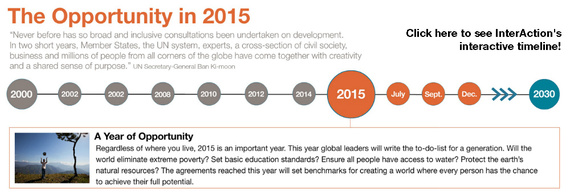As we move into 2015, advocating for civil society space and voice will remain one of the leading priorities. This is a seminal year for development, a moment that calls on us to envision the world we want to see, and to act to create that world for future generations. As dialogue among member states for the post-2015 agenda begins, civil society is called to press forward with new ideas and take on the root causes that limit progress on development outcomes. And we must be informed by the Third International Conference on Financing for Development to be held in Addis Ababa in July 2015. To build the just, equitable world that we want, a continuous robust engagement by civil society is vital.
Each year, InterAction members alone invest and manage $18 billion. Many large U.S. NGOs, once primarily funded by the U.S. government, transformed how they work and are now heavily funded by private resources collected through individual donations, private foundations, corporations, and multi-stakeholder partnerships. Civil society is in many cases the interlocutor when establishing and maintaining private-public collaborations. To develop a comprehensive financing approach that considers the entire financial ecosystem, we must guarantee space for civil society in the post-2015 Financing for Development process.
Civil society organizations play a dynamic role. They not only generate private resources, but also advocate for transparency and accountability to ensure that governments and private corporations responsibly employ funds. Through education, civil society organizations worldwide play a critical role in generating awareness about inclusive spending towards social services, the importance of a transparent government budget, and individual economic and political rights. Many international civil society organizations are ahead of governments in having strong relationships with local civil society groups and communities, and have long focused their work on vulnerable and marginalized groups. Acting together, civil society groups link governments, corporations, and others; this catalytic role is key to generating sustainable economic and social growth.
As civil society organizations continue as donors and educators, implementers and advocates, we must ask the tough questions about financing, governance, and systems that perpetuate poverty and exclusion and deny dignity. This year, 2015, is the year to do it.
Lindsay Coates is the acting CEO and President of InterAction -- the largest U.S. alliance of nongovernmental organizations working on global poverty issues. Coates also serves on boards of the Episcopal Relief and Development as well as the World Bank Global Partnership for Social Accountability.

